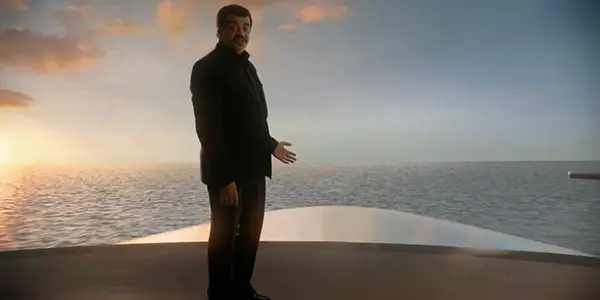“If we do not speak for earth, who will? If we are not committed to our own survival, who will be?” – Carl Sagan
Since the beginning of our comparatively sort existence, humanity has found ways to overcome unimaginable obstacles, many of our own making. One of the greatest challenges we will ever face lies in the vast distance between Earth and the stars. The Fleeting Grace of the Habitable Zone, the second episode in the third season of Carl Sagan’s all-important Cosmos series, explores the obstacles we have already overcome, as well as those that lie ahead.
Episode Summary
Since we’ve known of their existence, our species has had an ambition to travel to our nearest neighbor stars. The journey will be a dangerous and costly challenge, so much so that the only chance of success lies in our ability to put aside our differences; to come together in the singular pursuit of societal improvement and scientific advancement. As host Neil DeGrasse Tyson says: “I know we can do it. Why? Because we’ve done it before.”

One of the greatest examples of human ingenuity can be found with the early Polynesians, who braved the vast ocean in pursuit of the next step in their societal journey. Just like those brave early voyagers, modern society stands at the same precipice. A vast “ocean” of empty space lies between us and the next step in our collective journey.
But, there is a price that we must first be willing to pay. I cannot hope to explain this challenge and its rewards as well as Sagan himself did, so, like the conclusion of this episode, I’ll conclude the summary with his words. Read them, and heed them, carefully:
“Our very existence in that distant time requires that we will have changed our institutions and ourselves… It will not be we who reach Alpha Centauri and the other nearby stars; it will be a species very like us, but with more of our strengths and fewer of our weaknesses… The vast distances that separate the stars are providential. Beings and worlds are quarantined one from another. The quarantine is lifted only for those with sufficient self-knowledge and judgment to have safely traveled from star to star. Our remote descendants safely arrayed on many worlds through the solar system and beyond will be unified: by their common heritage, by their regard for their home planet, and by the knowledge that whatever other life may be, the only humans in all the universe come from Earth.”
Our Collective Identity
Before they are granted the gift of sunlight, baby chicks are left to their own devices in the arduous process of breaking through their eggshell. Without that shell, as well as the experience of breaking through it, they would ultimately lack the strength to survive. Similarly, humanity needs affirmation of the triumphs in our early history. If we continue to perpetuate the message of shows like Ancient Aliens, that humanity has not been responsible for rising above its own challenges but instead owes its survival to visitors from other worlds, we risk endorsing the very thing that will ultimately give us the strength to survive. In addition, we disregard the great gifts given to us by our Mother Earth.
In that message is revealed the triumphant bravery of those original Polynesian voyagers. Courage of that magnitude may never be known again. Even when we eventually journey to the stars, we will at least have the advantage of being able to see a target, thanks to technology that allows us to see further and further into space. They had no such indications that there would be anything but death at the end of their journey. And yet, they ventured forth anyway, knowing that the journey would most likely cost their lives. What incredible bravery. People did that. Not aliens. Not gods. People. As Sagan was fond of saying: “For all our failings… We humans are capable of greatness.”
Rising Above a Worldwide Challenge
It’s a frightening time for the human species. Finding ways to solve problems such as the pandemic spreading across our world requires that we join together to implement and enforce the regulations offered by scientific experts. Indeed, such experts are our best defense against these threats. Why, then, do we still insist on disregarding their advice?
Carl Sagan often referred to science as “a candle in the dark.” Science can help us cut through the darkness of space, as well as the psychological darkness of ignorance and fear. The catch is, we have to let it shine. Cosmos: Possible Worlds continues to present science exactly as it should be presented: as a critically important, yet fascinating journey of discovery and enlightenment, a candle in the darkness of our relatively short journey as a species.
Does content like this matter to you?
Become a Member and support film journalism. Unlock access to all of Film Inquiry`s great articles. Join a community of like-minded readers who are passionate about cinema - get access to our private members Network, give back to independent filmmakers, and more.